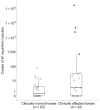A real-time PCR assay for the quantification of Mycoplasma equirhinis in tracheal wash samples from Thoroughbred horses
- PMID: 37919953
- PMCID: PMC10734586
- DOI: 10.1177/10406387231207631
A real-time PCR assay for the quantification of Mycoplasma equirhinis in tracheal wash samples from Thoroughbred horses
Abstract
Mycoplasma equirhinis is the predominant equine Mycoplasma sp. isolated from clinically normal horses and is suspected to be associated with inflammatory airway disease in which cough is the primary sign. Quantitative evaluation of bacterial counts is useful in assessing the association between the bacteria in samples and observed clinical signs, but this evaluation has been difficult with conventional culture methods of M. equirhinis given the need for pre-enrichment using liquid cultures. We established a quantitative real-time PCR (qPCR) assay for the quantification of M. equirhinis, targeting the hypothetical protein FJM08_00025. We confirmed its high species-specificity for M. equirhinis and a limit of detection of 2.9 copies/reaction. We quantified M. equirhinis in tracheal wash samples from 20 clinically normal horses and 22 coughing horses. The copy numbers detected by qPCR in 18 of the 22 samples from clinically affected horses were within the range detected in the 20 clinically normal horses (0-84 copies/reaction). The remaining 4 samples had considerably higher copy numbers (734-1,620,000 copies/reaction), suggesting the likely involvement of M. equirhinis infection. Quantitative evaluation of M. equirhinis over time using our qPCR assay may allow a more accurate assessment of M. equirhinis infection in coughing horses compared to culture methods.
Keywords: Mycoplasma equirhinis; horses; quantitative PCR assay.
Conflict of interest statement
Declaration of conflicting interestsThe authors declared no potential conflicts of interest with respect to the research, authorship, and/or publication of this article.
Figures

Similar articles
-
Epidemiology and pathogenicity of M. equirhinis in equine respiratory disorders.Vet Microbiol. 2023 Dec;287:109926. doi: 10.1016/j.vetmic.2023.109926. Epub 2023 Nov 22. Vet Microbiol. 2023. PMID: 38006720
-
High prevalence of Mycoplasma equirhinis in Thoroughbred horses with respiratory symptoms in autumn 2018.J Vet Med Sci. 2021 Dec 9;83(12):1907-1912. doi: 10.1292/jvms.21-0163. Epub 2021 Nov 4. J Vet Med Sci. 2021. PMID: 34732605 Free PMC article.
-
Detection of Mycoplasma spp. in horses with respiratory disorders.Equine Vet J. 2023 Sep;55(5):747-754. doi: 10.1111/evj.13918. Epub 2023 Jan 9. Equine Vet J. 2023. PMID: 36572918
-
Development and evaluation of a real-time polymerase chain reaction method for the detection of Mycoplasma felis.J Vet Diagn Invest. 2011 Sep;23(5):890-3. doi: 10.1177/1040638711407479. Epub 2011 Jun 15. J Vet Diagn Invest. 2011. PMID: 21908343
-
Viremia and nasal shedding for the diagnosis of equine herpesvirus-1 infection in domesticated horses.J Vet Intern Med. 2024 May-Jun;38(3):1765-1791. doi: 10.1111/jvim.16958. Epub 2023 Dec 9. J Vet Intern Med. 2024. PMID: 38069548 Free PMC article. Review.
References
-
- Ade J, et al.. Quantitative analysis of Mycoplasma wenyonii and ‘Candidatus Mycoplasma haemobos’ infections in cattle using novel gapN-based realtime PCR assays. Vet Microbiol 2018;220:1–6. - PubMed
-
- Hooker JM, Butler M. The development of complement-fixing antibody in horses after infection with Mycoplasma equirhinis. J Comp Pathol 1977;87:281–286. - PubMed
MeSH terms
Supplementary concepts
LinkOut - more resources
Full Text Sources

